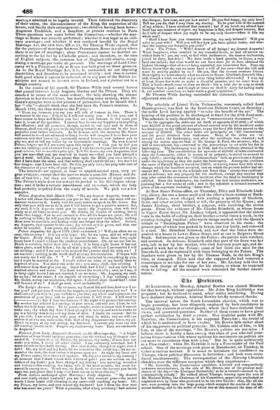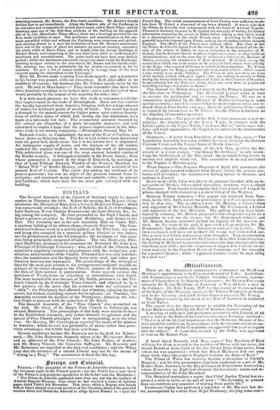ZbE larobinces.
At Launceston, on Monday, Admiral Bowles was elected Member for that borough, without opposition. Mr. John King Lethbridge was proposed ; but he declined to stand, other duties interfering. Having been declared duly elected, Admiral Bowles briefly returned thanks.
The interval before the South Lancashire election, which was to begin yesterday, has been diligently employed by both candidates in meeting the electors at several places ; where they have declared their views, and answered questions. Neither nf them seems to have given perfect satisfaction by their answers. One doubtful point with Mr. Eutwisle, the Conservative, is his supposed Pusey ism ; the denial of which he is understood to have evaded. Mr. Brown falls rather short of his supporters on political grouuds : Mr. Cobden said of him, to his face, at one of the meetings, "Mr. Brown's politics are not mine : I believe there is hardly a man among that class of you who call your- selves Conservatives with whose opinions his sentiments on politics are not more in accordance than with mine." But he is quite satisfactory as a Free-trader ; while Mr. Eotwisle is only a Free-trader of the Peel school. One of the meetings took place at Manchester, on Tuesday, Ia rather a curious manner. It is usual to introduce the candidates on 'Change, where political discussion is forbidden ; and both were intro- duced simultaneously. The correspondent of the Morning Chronicle chuckles over the different reception which they experienced-
" Mr. Entwisle, the Conservative candidate, a retired and comparatively unknown manufacturer, by the side of Mr. Brown, one of the greatest mer- chants of the day= the Liverpool Rothschild,' as he is termed—seemed to be comparatively nobody ! He walked about 'Change, leaning upon the arm of Mr. Richard Birley, the Chairman of his Committee, apparently overlooked or neglected even by those who professed to be his own friends: they, like all the rest, were pressing into the large group which occupied the centre of the im- mense building, and in the midst of which was at this moment the man of all-
absorbing interest, Mr. Brown, the Free-trade candidate. Mr. Brown's friends decided how to act immediately. Along the Eastern side of the Exchange is an extensive and comparatively retired paved court, called Duck Place ; and by throwing open one of the first-floor windows of the building on the opposite side of it, (the Manchester Times office,) there was a hustings provided for the Free-trade candidate at once. The merchants and manufacturers at this mo- ment assembled within and without the Exchange were numerous and excited ; and, obeying almost to a man the invitation to bear Mr. Brown's sentiments, there was in the course of about ten minutes an open-air meeting, extending the whole width of Ducie Place, and in length from the Arcade Buildings to Market Street, and comprising at the very least from 4,000 to 5,000 bond fide, merchants and manufacturers. The space could not have been more densely packed ; whilst the merchants who could not get out stood inside the Exchange, listening in eager anxiety to the statements Mr. Brown and his friends made. The meeting, too, was as remarkable for the wealth represented as for its numbers. To give a list of names would only he to copy those of the most eminent among the subscribers to the Exchange."
Here Mr. Brown made a strong Free-trade speech ; and a resolution in his favour was passed, with one dissentient. Both sides affect to be confident of success ; but business-like Mr. Cobden speaks more by the card. He said at Manchester—" They must remember that there were three hundred townships to be looked after ; and a vote for each of these would probably be the utmost of the majority for either side."
It is with much pleasure we have this week to announce a still fur- ther improvement in the trade of Birmingham. Since our last number the Acadia has arrived from America, bringing with her a large amount of orders for hardware goods of nearly all kinds. The result has been a demand by the manufacturers for higher prices upon various descrip- tions of articles, many of which had, during the late depression, been made at a ruinously low rate. The commercial accounts received by thii arrival are altogether of a more favourable character, and well calculated to inspire a hope that the present improvement in the Ame- rican trade is not merely temporary.—Birmingham Journal, May 18.
Naworth Castle, in Cumberland, the seat of the Earl of Carlisle, was burnt down on Saturday last. The fire is said to have been discovered near the great hall, about noon ; but it is not known how it originated. An inadequate supply of water, and the dryness of the old timber, rendered the engines ineffectual in arresting the work of destruction. This celebrated place was one of the most ancient baronial castles of the Border country. It belonged originally to the Dacre family ; from whose possession it passed in the reign of Elizabeth, by marriage, to that of Lord William Howard, Warden of the Western Marches, the " Belted Will " of Border History, and the renowned ancestor of the present Earl of Carlisle. The castle was seldom the residence of its present possessor ; but was an object of the greatest interest from its antiquity ; and contained many curious and valuable relics, in armour and furniture, which have been for the most part destroyed with the building.



























 Previous page
Previous page